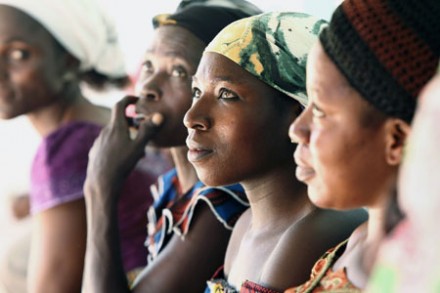By Francis Phillips on Thursday, 23 August 2012, Catholic Herald
 |
| Nigerian women wait for antiretroviral treatment outside a clinic at a Catholic hospital (CNS photo) |
Those who criticise the Church’s refusal to sanction the use of condoms in combating Aids often overlook the fact that the Church is one of the largest charitable organisations providing loving care to victims. Fr Czerny explains that the Church’s position “is a much more holistic and reasonable and effective approach, which doesn’t cut corners and which doesn’t enhance or promote disrespect between people”. AJAN is coordinated by a team run from AJAN House in Kangani, a very poor settlement on the outskirts of Nairobi. As its website explains, each of the 10 Jesuit Provinces and Regions in Africa has Aids programmes under way wherever they have a presence: in youth centres, parishes, university chaplaincies, secondary and primary schools, orphanages, hospitals and dispensaries.
The report goes on to say that pregnant mothers infected with HIV can receive an injection to ensure the virus won’t be passed on to their child during birth; this costs about $100 dollars compared to the estimated $300,000 a government spends throughout the life of someone living with HIV. This is only one of AJAN’s projects. Fr Czerny emphasises that AJAN starts with afflicted individual human beings, not with impersonal statistics. He comments: “I think from the outside we tend to use many zeros, we talk about huge numbers and alarming trends and we lose touch or we never get in touch with what it means for the individual, for the family, for the community, and finally for the country.”
The AJAN approach, which includes counselling, home-based care and education, as well as economic and medical support, considers it crucial to listen to people living with HIV and others who are affected, to shape responses according to their needs and to invite their participation in services offered. It is a very different approach from that shown by global organisations such as the UN.
In this connection, and in view of the publicity given to her recent conference in London to raise awareness of her Foundation’s work among African women, it is noteworthy that the charitable work of Melinda Gates, wife of philanthropist Bill Gates, has been criticised in L’Osservatore Romano, the Vatican newspaper. Author of the piece, Giulia Galeotti, writes that “to still believe that by opposing the use of condoms the Catholic Church leaves women and children to die because of misogynist intransigence is a baseless and shoddy reading”. Our own veteran Herald columnist, Mary Kenny, in her always courteous and diplomatic fashion, has also drawn attention to the questionable morality of some of the methods promoted by the Melinda Gates Foundation.
No one doubts that the Gates Foundation does good work in Third World countries, especially in the eradication of malaria. But perhaps they could also learn from the Jesuits and their co-workers in AJAN? Respecting human, female and marital dignity means understanding and being sensitive to the culture of those afflicted. When you are a global organisation, there is a temptation, as Fr Czerny says, to talk about “huge numbers” and to “lose touch with what it means for the individual” and for their families and wider communities. Those who dismiss the Church as heartless should be aware that Catholic organisations provide 25 per cent of all HIV treatment, care and support throughout the world and this proportion is highest in Africa – nearly 100 per cent in remote areas. Instead of seeing it as out of touch, out of date and puritanical, international secular foundations might do better to harness the Church’s wisdom and long experience of working in Third World countries.


No comments:
Post a Comment